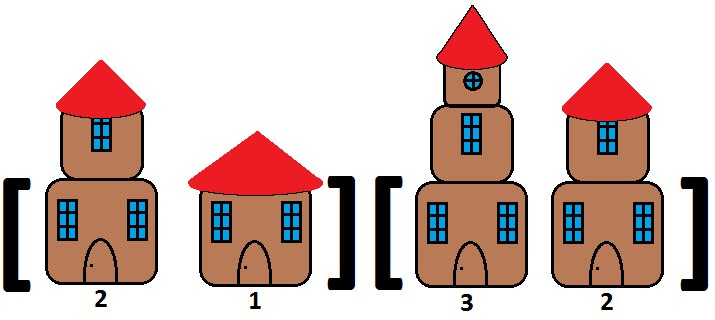Codeforces 599C. Day at the Beach 模拟
One day Squidward, Spongebob and Patrick decided to go to the beach. Unfortunately, the weather was bad, so the friends were unable to ride waves. However, they decided to spent their time building sand castles.
At the end of the day there were n castles built by friends. Castles are numbered from 1 to n, and the height of the i-th castle is equal tohi. When friends were about to leave, Squidward noticed, that castles are not ordered by their height, and this looks ugly. Now friends are going to reorder the castles in a way to obtain that condition hi ≤ hi + 1 holds for all i from 1 to n - 1.
Squidward suggested the following process of sorting castles:
- Castles are split into blocks — groups of consecutive castles. Therefore the block from i to j will include castles i, i + 1, ..., j. A block may consist of a single castle.
- The partitioning is chosen in such a way that every castle is a part of exactly one block.
- Each block is sorted independently from other blocks, that is the sequence hi, hi + 1, ..., hj becomes sorted.
- The partitioning should satisfy the condition that after each block is sorted, the sequence hi becomes sorted too. This may always be achieved by saying that the whole sequence is a single block.
Even Patrick understands that increasing the number of blocks in partitioning will ease the sorting process. Now friends ask you to count the maximum possible number of blocks in a partitioning that satisfies all the above requirements.
The first line of the input contains a single integer n (1 ≤ n ≤ 100 000) — the number of castles Spongebob, Patrick and Squidward made from sand during the day.
The next line contains n integers hi (1 ≤ hi ≤ 109). The i-th of these integers corresponds to the height of the i-th castle.
Print the maximum possible number of blocks in a valid partitioning.
3
1 2 3
3
4
2 1 3 2
2
In the first sample the partitioning looks like that: [1][2][3].

In the second sample the partitioning is: [2, 1][3, 2]

题意:将这n个数分成几个区间,在每个区间内进行升序排序,最后要总体是升序的。
思路:后面的区间的最小的数一定会比前面区间最大的数还要大或者相等。Max[i]表示从1一个数到第i的数中最大的那个数,那Max数组一定是升序的。从最后一个数开始往前,Min表示当前的最小值,如果最小值大于或等于当前位置的最大值,那么区间数量就加1。

#include<bits/stdc++.h> using namespace std; int h[100010],Max[100010]; int main() { int i,n; scanf("%d",&n); Max[0]=0; for(i=1; i<=n; i++) { scanf("%d",&h[i]); if(h[i]>Max[i-1]) Max[i]=h[i]; else Max[i]=Max[i-1]; } int ans=0,Min=1000000010; for(i=n;i>0;i--) { if(Min>=Max[i]) ans++; if(Min>h[i]) Min=h[i]; } cout<<ans<<endl; }


 浙公网安备 33010602011771号
浙公网安备 33010602011771号